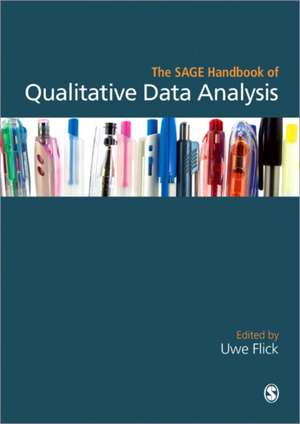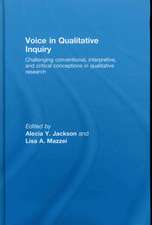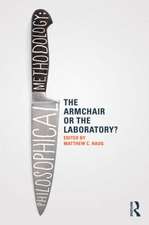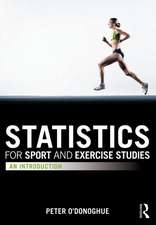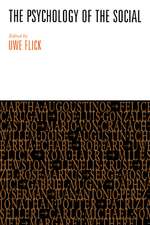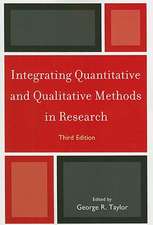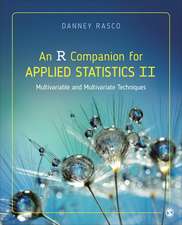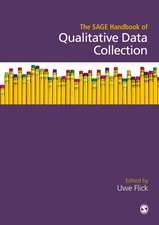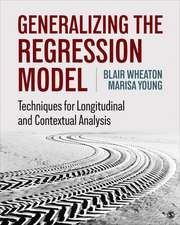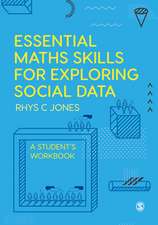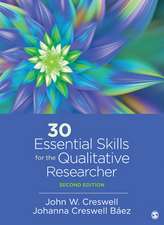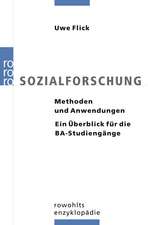The SAGE Handbook of Qualitative Data Analysis
Editat de Uwe Flicken Limba Engleză Hardback – 17 dec 2013
Written by a team of experts in qualitative research from around the world, this handbook is an essential compendium for all qualitative researchers and students across the social sciences.
Preț: 1122.59 lei
Preț vechi: 1537.79 lei
-27% Nou
Puncte Express: 1684
Preț estimativ în valută:
214.81€ • 224.84$ • 178.79£
214.81€ • 224.84$ • 178.79£
Carte tipărită la comandă
Livrare economică 31 martie-14 aprilie
Preluare comenzi: 021 569.72.76
Specificații
ISBN-13: 9781446208984
ISBN-10: 1446208982
Pagini: 664
Dimensiuni: 184 x 246 x 45 mm
Greutate: 1.34 kg
Ediția:1
Editura: SAGE Publications
Colecția Sage Publications Ltd
Locul publicării:London, United Kingdom
ISBN-10: 1446208982
Pagini: 664
Dimensiuni: 184 x 246 x 45 mm
Greutate: 1.34 kg
Ediția:1
Editura: SAGE Publications
Colecția Sage Publications Ltd
Locul publicării:London, United Kingdom
Recenzii
Uwe Flick’s handbook of qualitative data analysis is an illuminating new resource for qualitative and mixed methods scholars. What these authors do in exploring how we think when we do analysis will be invaluable for practicing researchers, novices and experienced hands alike. These essays will also provoke further investigation, discussion, and theorizing about what was once the most neglected area of qualitative research practice. The handbook represents the breadth and depth of what we do when we make sense of information we have gathered about our world. It is an exciting contribution to the methodological literature, and I congratulate Dr. Flick and his colleagues for their achievement here.
This is an essential resource for the rapidly expanding ranks of researchers employing qualitative practices of inquiry. It represents the most sophisticated, broad-ranging, and multi-vocal array of contributions to the analysis of qualitative data yet available. There are now many texts on qualitative methods, but this is one is unique. It covers ground largely untouched by others, and with responsible attention to multiple points of view. My enthusiastic congratulations to the editor and authors.
Qualitative data analysis frequently appears to be a mysterious process to students and often experienced researchers alike. This excellent handbook removes the mystery and unveils invaluable insights into all facets of this crucial phase of the research process. I can’t think of a single aspect of analysis that is left without coverage, so that it will become a ‘must read’ for qualitative researchers for many years to come. Uwe Flick is to be congratulated for putting together such an exceptional collection.
This is a comprehensive account of a large variety of approaches to qualitative data analysis, written by leading international experts in the relevant methodological fields. For those who are confused about different analytic methods in qualitative research this book will clarify overlaps and differences, inform readers about the key features of each approach and will in general be an important resource for students and practitioners of social research.
There are many handbooks on qualitative data, but fewer on qualitative data analysis. This book will appeal to those seeking practical guidance on how to analyse various forms of qualitative data and learn about different analytical strategies…This is a really useful and up-to-date reference book, valuable for anyone who wants to expand their analysis toolkit.
With The SAGE Handbook of Qualitative Data Analysis, the editor, Uwe Flick, intends to raise awareness among readers of contemporary debates in qualitative research. The work is not intended to provide definitive answers or to identify the best research approach, but rather to outline the variety in how scientists deal with qualitative data analysis from different disciplinary, epistemological and methodological standpoints... In our view, the value of this work is in the interest in the value and utility of qualitative research, not only within the academic but also in policy-oriented and social contexts.
This is an essential resource for the rapidly expanding ranks of researchers employing qualitative practices of inquiry. It represents the most sophisticated, broad-ranging, and multi-vocal array of contributions to the analysis of qualitative data yet available. There are now many texts on qualitative methods, but this is one is unique. It covers ground largely untouched by others, and with responsible attention to multiple points of view. My enthusiastic congratulations to the editor and authors.
Qualitative data analysis frequently appears to be a mysterious process to students and often experienced researchers alike. This excellent handbook removes the mystery and unveils invaluable insights into all facets of this crucial phase of the research process. I can’t think of a single aspect of analysis that is left without coverage, so that it will become a ‘must read’ for qualitative researchers for many years to come. Uwe Flick is to be congratulated for putting together such an exceptional collection.
This is a comprehensive account of a large variety of approaches to qualitative data analysis, written by leading international experts in the relevant methodological fields. For those who are confused about different analytic methods in qualitative research this book will clarify overlaps and differences, inform readers about the key features of each approach and will in general be an important resource for students and practitioners of social research.
There are many handbooks on qualitative data, but fewer on qualitative data analysis. This book will appeal to those seeking practical guidance on how to analyse various forms of qualitative data and learn about different analytical strategies…This is a really useful and up-to-date reference book, valuable for anyone who wants to expand their analysis toolkit.
With The SAGE Handbook of Qualitative Data Analysis, the editor, Uwe Flick, intends to raise awareness among readers of contemporary debates in qualitative research. The work is not intended to provide definitive answers or to identify the best research approach, but rather to outline the variety in how scientists deal with qualitative data analysis from different disciplinary, epistemological and methodological standpoints... In our view, the value of this work is in the interest in the value and utility of qualitative research, not only within the academic but also in policy-oriented and social contexts.
Cuprins
PART ONE: MAPPING THE FIELD
Mapping the Field - Uwe Flick
PART TWO: CONCEPTS, CONTEXTS, BASICS - Uwe Flick
Notes Toward a Theory of Qualitative Data Analysis - Joseph A Maxwell and Margaret Chmiel
Analytic Inspiration in Ethnographic Fieldwork - Jaber F Gubrium and Jim A Holstein
Sampling Strategies in Qualitative Research - Tim Rapley
Transcription as a Crucial Step of Data Analysis - Sabine Kowal and Daniel C O'Connell
Collaborative Analysis of Qualitative Data - Flora Cornish, Alex Gillespie and Tania Zittoun
Qualitative Comparative Practices: Dimensions, Cases, and Strategies - Monika Palmberger and Andre Gingrich
Reflexivity and the Practice of Qualitative Research - Tim May and Beth Perry
Induction, Deduction, Abduction - Jo Reichertz
Interpretation and Analysis - Carla Willig
PART THREE: ANALYTIC STRATEGIES
Grounded Theory and Theoretical Coding - Robert Thornberg and Kathy Charmaz
Qualitative Content Analysis - Margit Schreier
Phenomenology as a Research Method - Thomas S Eberle
Narrative Analysis: The Constructionist Approach - Cigdem Esin, Mastoureh Fathi and Corinne Squire
Documentary Method - Ralf Bohnsack
Hermeneutics and Objective Hermeneutics - Andreas Wernet
Cultural Studies - Rainer Winter
Netnographic Analysis: Understanding Culture through Social Media Data - Robert V Kozinets Pierre-Yann Dolbec and Amanda Earley
Using software in Qualitative Analysis - Graham R Gibbs
PART FOUR: TYPES OF DATA AND THEIR ANALYSIS
Analyzing Interviews - Kathryn Roulston
Analyzing Focus Groups - Rosaline S Barbour
Conversations and Conversation Analysis - Merran Toerien
Discourses and Discourse Analysis - Carla Willig
Analyzing Observations - Amir B Marvasti
Analyzing Documents - Amanda Coffey
Analyzing News Media - Darrin Hodgetts and Kerry Chamberlain
Analyzing Images - Marcus Banks
Analysis of Film - Lothar Mikos
Analyzing Sounds - Christoph Maeder
Video Analysis and Videography - Hubert Knoblauch, René Tuma and Bernt Schnettler
Analyzing Virtual Data - Winfried Marotzki, Jens Holze and Dan Verständig
PART FIVE: USING AND ASSESSING QUALITATIVE DATA ANALYSIS
Reanalysis of Qualitative Data - David Wästerfors, Malin Åkerström and Katarina Jacobsson
Qualitative Meta-analysis - Ladislav Timulak
Quality of Data Analysis - Rosaline S Barbour
Ethical Use of Qualitative Data and Findings - Donna M Mertens
Analytic Integration in Qualitative-Driven (QUAL) Mixed- and Multiple-Method Designs - Janice M Morse and Lory J Maddox
Generalization in and from Qualitative Analysis - Joseph Maxwell and Margaret Chmiel
Theorization from Data - Udo Kelle
Writing and/as Analysis or Performing the World - Norman K Denzin
Implementation: Putting Analyses into Practice - Michael Murray
Mapping the Field - Uwe Flick
PART TWO: CONCEPTS, CONTEXTS, BASICS - Uwe Flick
Notes Toward a Theory of Qualitative Data Analysis - Joseph A Maxwell and Margaret Chmiel
Analytic Inspiration in Ethnographic Fieldwork - Jaber F Gubrium and Jim A Holstein
Sampling Strategies in Qualitative Research - Tim Rapley
Transcription as a Crucial Step of Data Analysis - Sabine Kowal and Daniel C O'Connell
Collaborative Analysis of Qualitative Data - Flora Cornish, Alex Gillespie and Tania Zittoun
Qualitative Comparative Practices: Dimensions, Cases, and Strategies - Monika Palmberger and Andre Gingrich
Reflexivity and the Practice of Qualitative Research - Tim May and Beth Perry
Induction, Deduction, Abduction - Jo Reichertz
Interpretation and Analysis - Carla Willig
PART THREE: ANALYTIC STRATEGIES
Grounded Theory and Theoretical Coding - Robert Thornberg and Kathy Charmaz
Qualitative Content Analysis - Margit Schreier
Phenomenology as a Research Method - Thomas S Eberle
Narrative Analysis: The Constructionist Approach - Cigdem Esin, Mastoureh Fathi and Corinne Squire
Documentary Method - Ralf Bohnsack
Hermeneutics and Objective Hermeneutics - Andreas Wernet
Cultural Studies - Rainer Winter
Netnographic Analysis: Understanding Culture through Social Media Data - Robert V Kozinets Pierre-Yann Dolbec and Amanda Earley
Using software in Qualitative Analysis - Graham R Gibbs
PART FOUR: TYPES OF DATA AND THEIR ANALYSIS
Analyzing Interviews - Kathryn Roulston
Analyzing Focus Groups - Rosaline S Barbour
Conversations and Conversation Analysis - Merran Toerien
Discourses and Discourse Analysis - Carla Willig
Analyzing Observations - Amir B Marvasti
Analyzing Documents - Amanda Coffey
Analyzing News Media - Darrin Hodgetts and Kerry Chamberlain
Analyzing Images - Marcus Banks
Analysis of Film - Lothar Mikos
Analyzing Sounds - Christoph Maeder
Video Analysis and Videography - Hubert Knoblauch, René Tuma and Bernt Schnettler
Analyzing Virtual Data - Winfried Marotzki, Jens Holze and Dan Verständig
PART FIVE: USING AND ASSESSING QUALITATIVE DATA ANALYSIS
Reanalysis of Qualitative Data - David Wästerfors, Malin Åkerström and Katarina Jacobsson
Qualitative Meta-analysis - Ladislav Timulak
Quality of Data Analysis - Rosaline S Barbour
Ethical Use of Qualitative Data and Findings - Donna M Mertens
Analytic Integration in Qualitative-Driven (QUAL) Mixed- and Multiple-Method Designs - Janice M Morse and Lory J Maddox
Generalization in and from Qualitative Analysis - Joseph Maxwell and Margaret Chmiel
Theorization from Data - Udo Kelle
Writing and/as Analysis or Performing the World - Norman K Denzin
Implementation: Putting Analyses into Practice - Michael Murray
Descriere
The first handbook to provide a state-of-the-art overview of the whole field of QDA, and a must-have for all qualitative researchers
